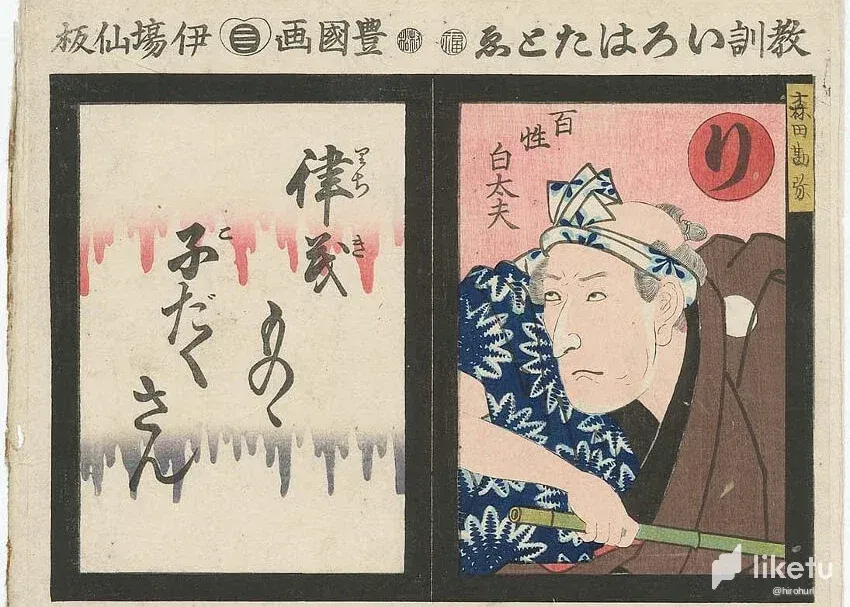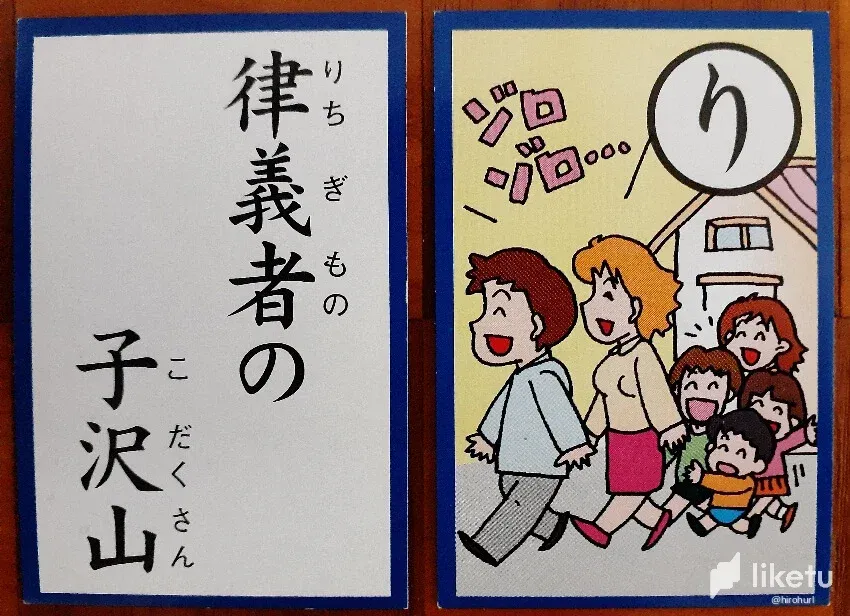

This is the ninth card in the Japanese series of proverb that illustrate the Japanese "alphabet" (or, more correctly, "syllabary').
At least, this card is ONE of the proverbs that illustrate the ninth syllable, "り," which is pronounced "Ri". (My other deck of Karuta uses a different proverb to illustrate "Ri," which I will deal with in an upcoming post.)
The proverb goes like this:
"Richigi mono no ko dakusan."
A direct word for word translation would go:
"Honest person 's children many."
In other words,
"An honest person has many children."
Interpretation
The word "mono" ("person") has typically been translated as "man" and is assumed to refer to the male of the species; a common explanation being that an honest may does not wander from his wife and therefore of his goodness sires upon her numerous children to the self-satisfaction of all involved, if the illustration on the Daiso card is to be believed.
Presumably our honest man is blessed with much fertile seed and a good and accomodating wife who, not being bad, happens not to be barren.
Edo Era Woodblock Illustration
I found this rather fetching woodblock illustration of the karuta in the public domain. The woodblock print is part of the https://www.mfa.org/ collection. It was created by Utagawa Kunisada around 1851 and depicts a famous actor of the day, Morita Kan'ya XI posing as "farmer Shirotayû," with the proverb written in flowing brushstrokes on the left.
If you compare the writing to that of the modern (Daiso) version of the proverb you may see some similarities. Enough of the artist's brushwork is legible for the whole proverb to be understood at a glance by a practised eye.
The headline above the illustration and proverb is written in the old style, from left to right and reads "Examples of the Kyokun Karuta." If you go to an old Japanese "izakaya" ("pub-restaurant") you often see old-style Kirin or Asahi beer posters written in that old right-to-left style for olde-worlde effect.
An Honest Farmer?
What is not so clear to me is how a portrait of farmer Shirotayû provides us with any hint as to what the proverb means. Are there any conventions in the illustration that would convey to us that he is an honest old cove?
The freshness and straightness of the bamboo stick, perhaps?
The steadfast heavenward gaze of the eyes?
The hachimaki (headband) signalling his readiness for a day of honest toil?
Maybe. But where is the fruit of his loins?
Business Application
If you build a business with an honest intention to provide your customers or clients with good value, and do not go chasing after underhand profits; if you build a good relationship with your chosen niche; if you "stay married" to just one business, or one product or service and do not go running after every attractive offer that comes your way; if you can do all that, my friends, you shall reap a rich reward many times over.
You shall be like a tree planted by the rivers of water, that bringeth forth his fruit in his season; your leaf also shall not wither; and whatsoever you do shall prosper.
Cheers!
David Hurley
#Index4Index
#InspiredFocus
